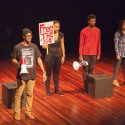Outstanding Women of Color awards honor faculty who’ve gone above and beyond
As well as achieving excellence in academics, the six winners of the 2009-10 University of Wisconsin–Madison Outstanding Women of Color awards have all stepped off the Madison campus and advocated for social justice in the greater community.
The third annual UW–Madison Outstanding Women of Color awards supplement the UW System Outstanding Woman of Color in Education Award, which is in its 15th year. While the latter once allowed the UW System schools to select several recipients, it has only recently modified the award to one nominee per school.
Recognizing UW–Madison’s multitude of accomplished women of color, the Office of the Vice Provost and Chief Diversity Officer decided to create an internal award to include more honorees.
A selection committee of nine students and faculty selected Patty Loew, associate professor of life sciences communication, as the UW–Madison nominee for the UW System award.
“Her reputation, not just statewide, nationally and internationally, that’s outstanding,” says Ruby Paredes, assistant vice provost for diversity and climate. “So truly, she merits the title ‘Outstanding Woman of Color in Education.’ You can drop the ‘of color.’ She’s an outstanding woman in education.”
Loew, a member of the Bad River Band of Lake Superior Ojibwe, was chosen for her work in journalism, filmmaking and education to promote cross-cultural understanding, especially pertaining to Native American people.
“What I’m really interested in is the institutional foundations for perception and the way we look at people who don’t think and act and look the way we do,” she says. “My work focuses on Native Americans, but it’s really cross-cultural.”
In 2001, Loew published her award-winning book, “Indian Nations of Wisconsin: Histories of Endurance and Renewal,” which is the first book that reconstructs Wisconsin Indian history from Native perspectives. It remains among the top five bestsellers of Wisconsin Historical Society Press sales.
She also wrote a fourth grade textbook, “Native People of Wisconsin,” in 2003 that is used in classrooms across the state.
“I like to look at institutional processes, especially as they relate to media and popular culture, to figure out how we can change things. It’s important to be honest, but it’s also important that people feel good about who they are,” she says. “I think when you feel good about who you are, and you’re confident in yourself, it’s easier to embrace other people’s differences and appreciate them for who they are.”
The UW System was also pleased with UW–Madison’s choice.
“I don’t think we would find too many others who have done more with their scholarship and activism to work on climate and status for both women and people of color in general,” says Helen Klebesadel, UW System director of the Women’s Studies Consortium. “There’s certainly no one who’s done more to educate the general population about the history and presence of Native American culture in Wisconsin. She ‘s literally written the book.”
But Loew emphasizes that her co-workers are crucial to her successes.
“I look at what I do and I see these threads that connect to almost every person that I work with in LSC,” she says. “What I’ve been able to achieve has been achievable only because of the people I’m connected to in my department. When you pull the threads tight, that’s who I am.”
Loew will be honored at the WSC’s 34th annual Wisconsin Women’s Studies and 5th annual UW System LGBTQ Conferences at UW-Whitewater, where she will participate in the awards ceremony and luncheon on April 17.
The other five UW–Madison honorees are:
- Gender and Women’s Studies lecturer and faculty associate Araceli Alonso was chosen for her work with women’s health issues, particularly within the Latina community. She volunteers for UNIDOS Against Domestic Violence and Planned Parenthood. She also contributes to efforts supporting women in developing countries.
- Emuye Asfaw, administrative officer in the Office of Human Resources, is admired by her co-workers for her dedication to her colleagues and department that goes beyond her job description. In her spare time, she volunteers at the Salvation Army Family Shelter and is a board member for a non-profit organization that advocates health care for poor communities in Ethiopia.
- Psychology and psychiatry professor Diane Gooding was nominated for her accomplishments and advocacy in the field of mental illness. As a professor in Department of Psychology and in the School of Medicine and Public Health, she works to dispel stereotypes about the mentally ill, and communicate that individuals with mental illnesses are people first. She does advocacy and outreach through the National Alliance on Mental Illness. She focuses primarily on people with schizophrenia.
- Sandy Magaña is an associate professor of Social Work and director of Chican@ Studies. She advocates for the Latino population on campus and in the greater community through her work in the Latino Social Workers Organization, the Mental Health Center of Dane County and others. Magaña helped form the Latin@ Faculty Staff Association and serves as a mentor for several ethnic minority groups on campus. She also teaches a service- learning course that travels to the U.S./Mexico border and advocates for social justice.
- Idella Yamben, a research assistant in Anatomy in the School of Medicine and Public Health, is praised for her dedication to increasing diversity in her field. She co-founded the Cellular and Molecular Biology Diversity Committee and founded the mentorship program, CELS (Creating Excellence in Leadership in Science). She studies cellular and molecular underpinnings of eye development.
The Office of the Vice Provost and Chief Diversity Officer will host a reception honoring Loew and the other five UW–Madison recipients at the Alumni Lounge of the Pyle Center, 702 Langdon St., on Tuesday, April 13 at 5 p.m. The event is free and open to the public.
Tags: diversity, events, faculty awards


